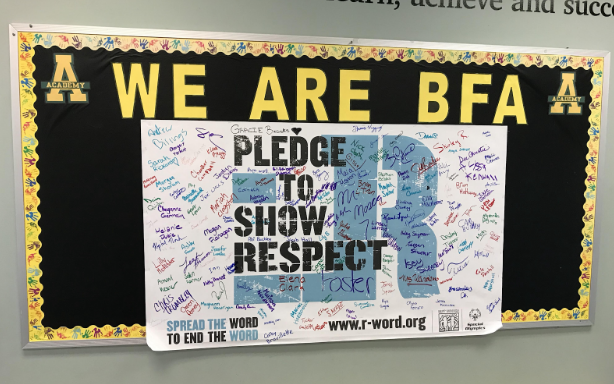The r-word you can use: respect
March 23, 2018
On March 7, students at BFA and around the United States pledged to stop using the r-word, also known as ‘retard’ or ‘retarded’.
This pledge is called Spread the Word to End the Word and was founded in 2009.
This movement was founded by a man from Fremd High School in Illinois named Soeren Palumbo, who had a sister with an intellectual disability. Palumbo heard someone use the r-word in reference to his sister. Palumbo crafted a speech in which he explained that an organization needed to be created in order to stop the use of the r-word.
After his inspired speech, Special Olympics created Spread the Word to End the Word and decided to hold a pledge on the first Wednesday in March every year. On this day, people around the United States sign a pledge that they will no longer use the r-word in order to spread more kindness in their community.
BFA advocates for this movement every year, as well as having an accepting Unified Sports team and fairly kind school community.
Unified Sports is a program that includes Special Olympics athletes (students with intellectual disabilities) and partners (students without intellectual disabilities) as teammates. The teams practice and compete in five different sports. This year, the five sports are: soccer, floorball, snowshoeing, basketball, and bocce.
Kasia Bilodeau is the coordinator of the Community Integration Program (CIP) at BFA and is the Assistant Coordinator of Unified Sports.
Bilodeau believes Unified Sports is vital to bring people together from different backgrounds and life experiences.
“I’m biased, but I think that [Unified Sports] brings people together from different situations and it allows students that might not be able to be involved in other school activities to be a part of a group. It brings in peers that are involved in other activities and it bridges gaps. It brings in all makes and models and evens out the playing field. It allows kids that have difficulties work with kids that don’t have difficulties and vice versa,” Bilodeau said.
Jim Naylor is the Cooperative Education Coordinator in the Northwest Tech Center (NWTC) and is the program coordinator of the Unified Sports program. Naylor previously worked in special education before moving to the NWTC.
Naylor stated his reasons that students should join the team.
“For Unified Sports, a student should join because they want to have fun, make new friendships, support the idea of inclusion, break down barriers; we’re more alike than we are different. And, for healthy activities,” Naylor said.
BFA has been participating in Spread the Word to End the Word ever since the first year the movement came about. Bilodeau explained how Special Olympics Vermont helps out BFA.
Special Olympics is the organization that created Spread the Word to End the Word. Each state has their own part of the organization, therefore BFA gets help from Special Olympics Vermont.
Special Olympics Vermont gets sponsored by different companies, which is how they give merchandise to schools. BFA and other schools hand out t-shirts, pins, bracelets, and more on Spread the Word to End the Word day in order to promote Special Olympics and eliminating the use of the r-word.
“So, we jumped on the bandwagon that first year. Special Olympics was great about getting us stuff, shirts and all that, and we have a poster that we sign. We, kind of, also morphed it into not just the r-word, but being kinder and [getting ridding of] all of those words that put down a part of our community, whether it’s your race, or any of those words, to stop using them,” Bilodeau said.
Naylor explained how BFA began advocating for Spread the Word to End the Word.
“Special Olympics Vermont asked us to promote [Spread the Word to End the Word] in our school. So, I sent out an email to the staff with different videos. It’s to promote respect, basically. So, that’s why we did it, and it has been embraced by our community, by the school. AWOD took on a few years ago promoting as well,” Naylor said.
Bilodeau also thinks that people should educate themselves on why the r-word hurts.
“[People should educate themselves] because words hurt. You walk down the hall and hear words that people don’t mean them [the way the word means]. When they use the r-word, they don’t mean necessarily that they’re putting down a student with an intellectual disability, they’re just using it because it’s a word they hear,” Bilodeau said.
According to CNN in an article titled Ending the R-Word: Ban it or understand it?, 43 of the 50 states have changed the medical term “mental retardation” to “intellectual disability”.
Although “mental retardation” is supposed to be used strictly as a medical term, society changed the word to be offensive toward people with intellectual disabilities. Many people don’t understand why the word is insulting.
Naylor explained his point of view on the use of the r-word.
“For someone with an intellectual disability to hear someone putting someone else down using that term can make them feel really badly about themselves. If a sibling of someone who has a disability hears that term being used, it’s hurtful. When a parent of someone who has a disability hears that term, it’s hurtful,” Naylor said.
There are messages left on the Spread the Word to End the Word website where members of the Special Olympics describe why the r-word is hurtful.
According to Joseph Franklin Stephens, an athlete of Special Olympics Virginia, the r-word hurts because it feels like exclusion. Another advocate says that people relate the r-word to being dumb or stupid, which is not true. Having an intellectual disability does not make someone stupid.
“I just don’t think it promotes respect, and we need more respect. We need more love in our society and communities,” Naylor said.

